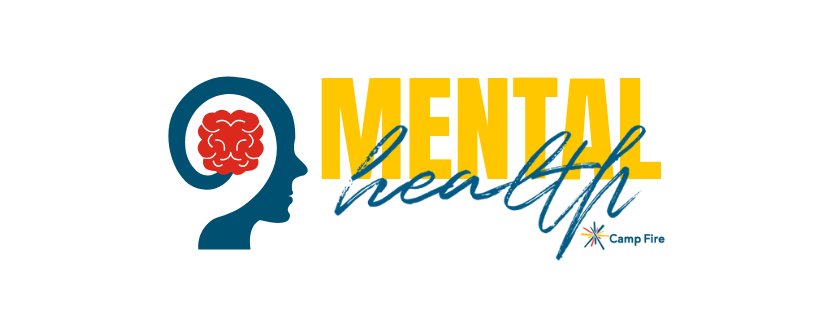Mental Health is a Key Part of Thriving

This February, we’re going to be focusing on youth mental health awareness. At Camp Fire, we help kids learn the tools they need to thrive: how to identify their sparks, develop a growth mindset, manage their goals and take time to reflect. Unfortunately, many young people are learning these life lessons in the context of added mental health challenges.

According to the National Alliance on Mental Illness, 20 percent of teens aged 13 to 18 are living with a mental health condition.

Adolescence is a pivotal time in life for mental wellness: 50 percent of mental health issues start by age 14; 75 percent begin by age 24. Too often, teens don’t seek the help they need, or only seek treatment when they’re older. Statistically, there’s an average of 10 years between when mental health symptoms emerge and when they are treated.
“We have an epidemic of anxiety, depression, and risk for suicide at younger and younger ages,” says Dr. Amanda Deacy, a child psychologist and associate professor of pediatrics at the University of Missouri-Kansas City School of Medicine. Deacy comments that, similar to overall health, our society doesn’t do the best job of helping prevent mental illness.
“Prevention, in this context, refers to establishing high quality attachment relationships between kids and parents, setting developmentally appropriate expectations for physical and academic performance, and focusing on effort, rather than outcome,” says Deacy, “…and modeling for children appropriate expressions of thoughts and feelings.”
This style of prevention aligns nicely with Camp Fire’s Thrive{ology} framework, especially when it comes to focusing on effort—that’s classic growth-mindset material. But we know it’s just a start. Camp Fire advocates for getting kids the expert help they need, when they need it.
“We would advise councils to seek out community partnerships to support mental health as well as follow recommendations from industry experts like the National Afterschool Association,” says Shawna Rosenzweig, director of program effectiveness at Camp Fire National Headquarters.

What are the warning signs that a child or teenager may be experiencing a mental health issue? The National Institute of Mental Health lists the following:
- Often feels anxious or worried
- Has very frequent tantrums or is intensely irritable much of the time
- Has frequent stomach aches or headaches with no physical explanation
- Is in constant motion, can’t sit quietly for any length of time
- Has trouble sleeping, including frequent nightmares
- Loses interest in things he or she used to enjoy
- Avoids spending time with friends
- Has trouble doing well in school, or grades decline
- Fears gaining weight; exercises, diets obsessively
- Has low or no energy
- Has spells of intense, inexhaustible activity
- Harms herself/himself, such as cutting or burning her/his skin
- Engages in risky, destructive behavior
- Harms self or others
- Smokes, drinks, or uses drugs
- Has thoughts of suicide
- Thinks his or her mind is controlled or out of control, hears voices
- The National Institute of Mental Health: Child & Adolescent Mental Health

If you’re worried about a child or teenager in your life, start by having a conversation.
“Talk, talk, talk,” Deacy says.
“Express interest in your child as a person—not for what they will become, or have been, but for what they are, think, feel, desire now.”

Then seek out additional help, if needed:
- Learn more about child and the mental health at the National Institute of Mental Health, the National Alliance on Mental Illness, and MentaHealth.gov.
- Talk to your doctor, who can refer you to a specialist.
- Find a good child psychologist in your area.
- Contact a crisis line, if you think a young person you care about might hurt themselves or others.
- National Suicide Prevention Lifeline, 1-800-273-8255, Free, 24/7. Trained crisis workers are available to help with all mental health crises, not just suicide prevention.
- Crisis Text Line, Text HOME to 741741. Free, 24/7. Crisis workers are available via text to counsel and connect you to help.
- TXT 4 Help, Text SAFE and location (address, city, state) to 4HELP. Free, 24/7. Teens in crisis will get directions to the nearest Safe Place site. Reply “2chat” to text with a counselor.
Sources:
“Mental Health Facts: Children and Teens,” National Alliance on Mental Illness.
“Warning Signs,” The National Institute of Mental Health: Child & Adolescent Mental Health.
“For Parents and Caregivers,” MentalHealth.gov.
This post originally appeared on campfire.org: https://campfire.org/blog/article/mental-health-is-key/
Want to help the young people around you discover their passions? Come volunteer with Camp Fire!
